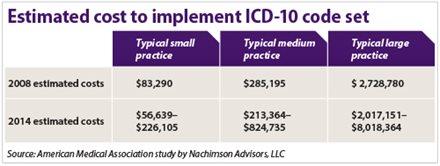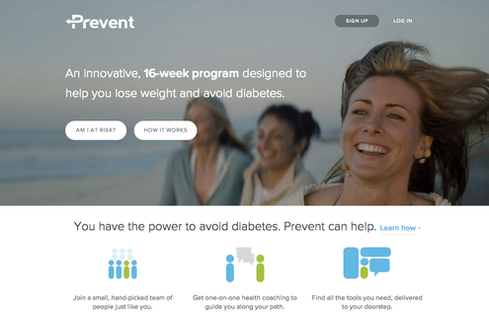ICD-10 May Cost 3X More Than Estimated, AMA Says
AMA study says ICD-10 transition could cost three times as much as previously estimated and association asks HSS to reconsider mandate.


8 Healthcare Startups Catch Fire
8 Healthcare Startups Catch Fire (Click image for larger view and for slideshow.)
Large healthcare practices could spend up to $8 million to implement the federally mandated ICD-10 code, almost three times more than previously estimated, a recently released American Medical Association study states.
"The Cost of Implementing ICD-10 for Physician Practices" updates a 2008 report. The latest research, conducted by Nachmison Advisors, determined that a typical small practice will spend between $56,639 and $226,105 on ICD-10, not the previously estimated $83,290. A typical midsized healthcare provider will spend between $213,364 and $824,735, instead of $285,195, and a large practice will expend between $2 million and $8 million instead of the previously predicted $2.3 million, the report said. Costs include physician productivity losses, payment disruptions, training, testing, and practice assessments, as well as the implementation itself.
"The markedly higher implementation costs for ICD-10 place a crushing burden on physicians, straining vital resources needed to invest in new health care delivery models and well-developed technology that promotes care coordination with real value to patients," said AMA President Dr. Ardis Dee Hovensaid in a news release. "Continuing to compel physicians to adopt this new coding structure threatens to disrupt innovations by diverting resources away from areas that are expected to help lower costs and improve the quality of care."
[Must IT be a burden? Read Doctors & EHR: Can This Shotgun Marriage Be Saved?]
The picture's even worse for those practices that don't get ICD-10 right the first time. Their expenses will increase as they repeat training, replace ineffective systems, or lose additional billing or productivity time, cautioned the report's writers.
"It's safe to say that ICD-10 will have a huge impact on healthcare administration. Computer systems will require considerable adaptation and clinicians and staff will need a great deal of education prior to the transition. ICD-10 demands significantly more specificity in diagnosing and coding, something the healthcare landscape isn't accustomed to or skilled in effecting at this time," said M. Alexandra Johnson, FACHE, and a consultant at Coleman Consulting Group.
The chances of improper planning increase as the Oct. 1, 2014 deadline draws closer -- especially as so many practices have yet to act on ICD-10. In a survey by Navicure last month, 74% of respondents have not begun their transition plan. Yet, only 9% of those polled are "not confident" they will be prepared. In January, 38% of the more than 570 physician practices polled by Medical Group Management Association had not yet started their ICD-10 implementation and only 9% had made "significant progress." None had finished.
Letter to Washington
The study spurred AMA CEO and Executive VP James Madara to write a letter to Health & Human Services Secretary Kathleen Sebelius asking her to "strongly" reconsider the ICD-10 mandate. The requirement is "not expected to improve the care physicians provide their patients and, in fact, could disrupt efforts to transition to new delivery models. The transition to ICD-10 represents one of the largest technical, operational, and business implementation in the health care industry in the past several decades. Implementing ICD-10 requires physicians and their office staff to contend with 68,000 diagnosis codes -- a five-fold increase from the approximately 13,000 diagnosis codes in use today," Madara wrote.
Many doctors view ICD-10 as an expensive, unfunded mandate, he continued. Based on the AMA report, the costs are even greater than many practices and pundits previously predicted, increasing the financial burden on physicians, Madara said.
To comply with ICD-10, doctors must invest in multiple solutions, the AMA said. These include complying with the EHR Meaningful Use mandate; buying EHR software or an upgrade certified for 2014 and ICD-10; updating practice management systems for ICD-10; incurring financial penalties in the form of cuts to Part B reimbursement, and mitigating a 2% cut that stemmed from the sequestration, according to Madara.
"Adopting ICD-10, while it may provide benefits to others in the health care system, is unlikely to improve the care physicians provide their patients and takes valuable resources away from implementing delivery reforms and health information technology," he said. "The AMA strongly urges CMS to reconsider the ICD-10 mandate."
Flip Side of ICD-10
ICD-10 isn't free -- but there are benefits, advocates say. New codes give providers more flexibility and detail when describing procedures and diagnoses, empowering healthcare organizations to improve operations such as claims processing efficiency and potentially improving overall healthcare costs.
"In the short-run, [ICD-10] could be highly disruptive to reimbursement patterns. However, in the long run, the coding specificity will enable the public health system to target health promotion strategies in a more effective way and we predict that claims data will be more meaningful. The sky's the limit from a HC admin standpoint in our use of data to bring about a healthier population and more efficient (which ideally translates into more profitable) healthcare delivery," said Johnson.
Medical data breaches seem to show up on the 6 o'clock news almost every week. If you think it wouldn't happen to you -- or the financial impact will be minor -- think again. Download the Healthcare Data Breaches Cost More Than You Think report today. (Free registration required.)
About the Author(s)
You May Also Like







